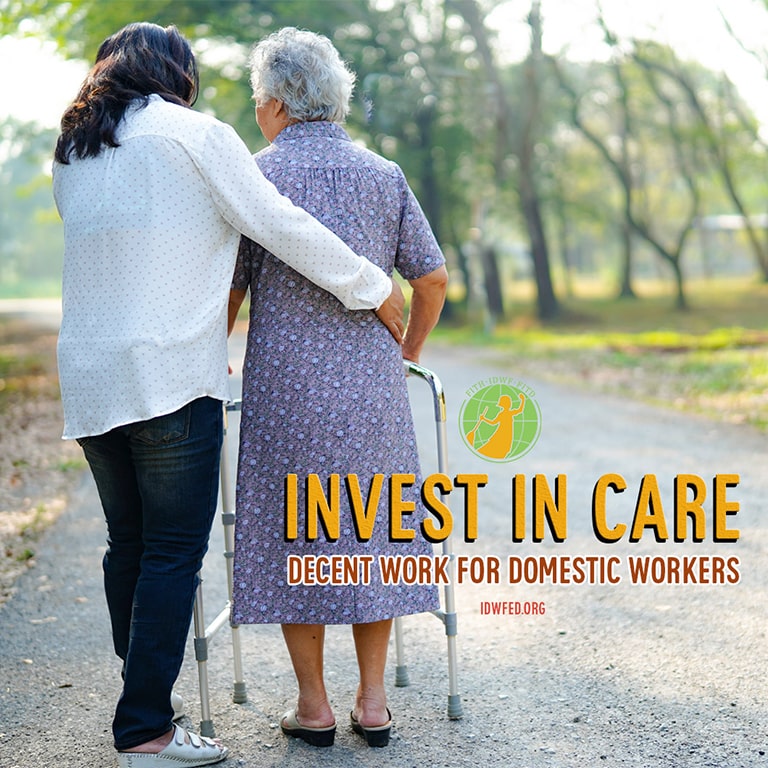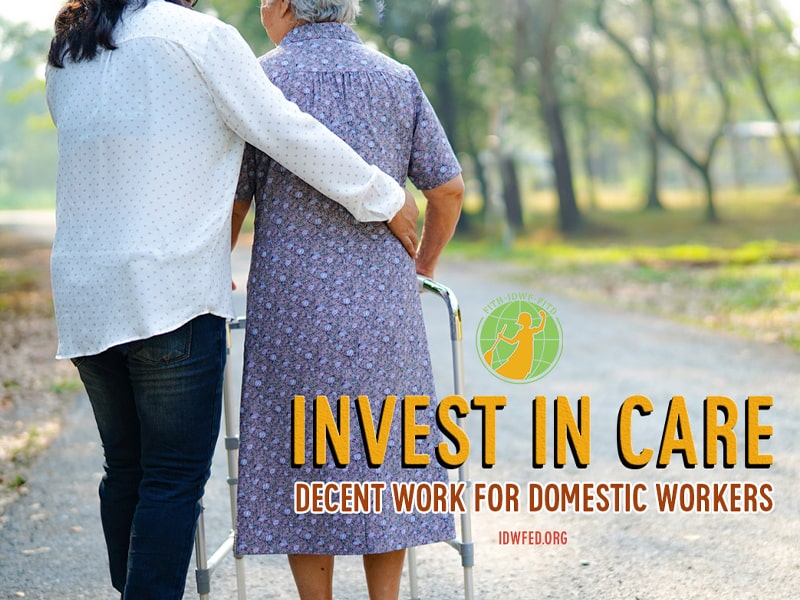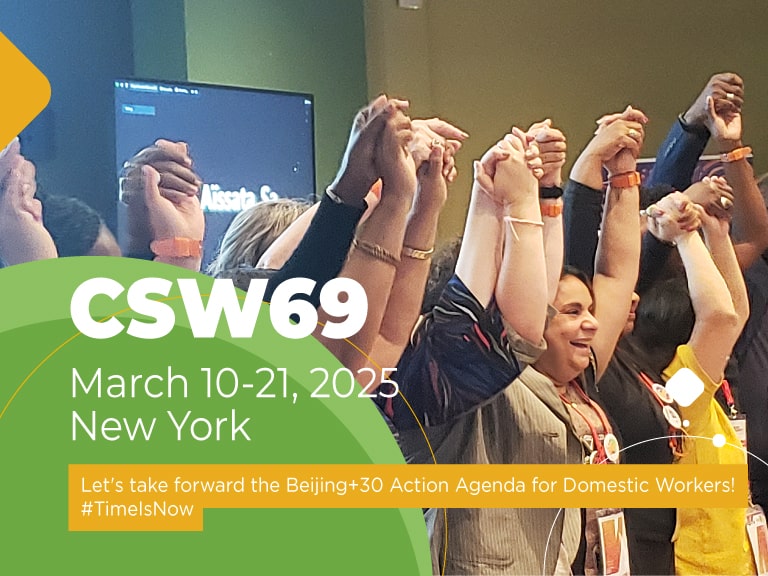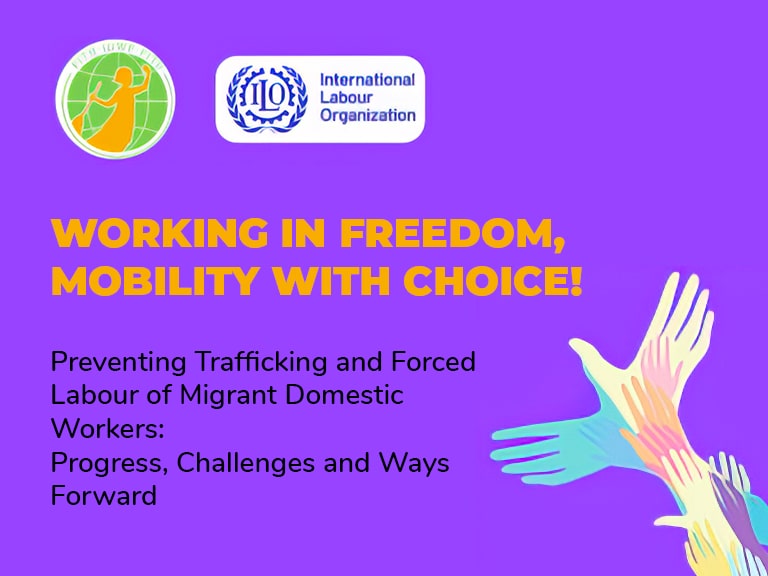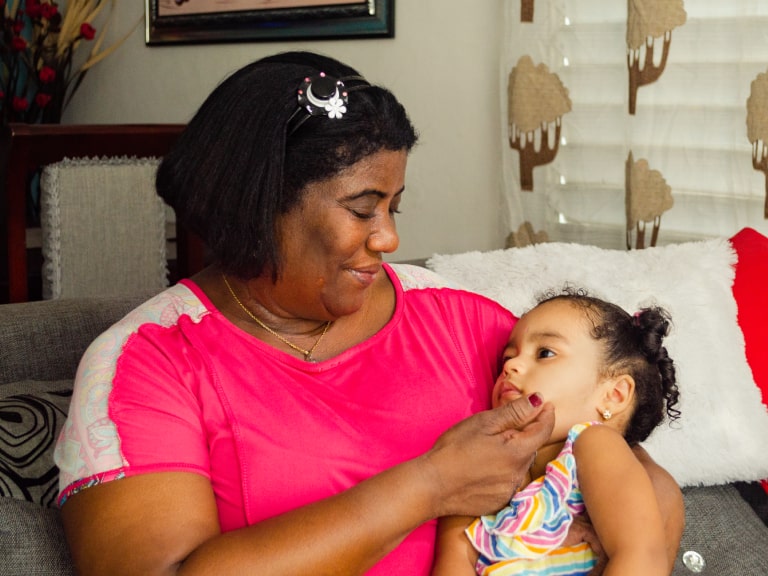- This event has passed.
IDWF Global meeting on care, October 25, 2020
Around 150 leaders and members of our affiliates from at least 47 countries joined a zoom meeting on CARE.
Details

Around 150 leaders and members of our affiliates from at least 47 countries joined a zoom meeting on CARE.
“We provide care to others,
but who will provide care to our elderly parents?”
IDWF’s President, Myrtle Witbooi, expressed this concern echoing the inherit problematic of the sector:
Domestic workers lift the major part of unrecognized care work and cover the gaps where institutional care such as hospitals and schools is lacking or failing, the care needs of our employees are thus attended to, but who will attend to ours?
Overview of Unions’ Work on Care Work
in the IDWF:
Our speakers took us on a journey through different regions for glimpses of how domestic workers and care workers organize, and how they perceive their contribution to the care economy.
Across these various contexts, one thing is clear:
domestic workers are part of the care economy, whether their labor is formalized and recognized or not.
Whichever category of work they perform, they end up significantly contributing to care work, precisely because of the nature of the private employment, and that households cannot be sustained without care.
Carmen Britez, Vice President and
General Secretary of UPACP, Argentina:
UPAC represents 85,000 members. It started the campaign of #CareForthoseWhoCareForYou with the government because after 2017, in collaboration with the IDWF and UNI Global, they wanted to use the learnings at an international level to incorporate care work within their struggle in Argentina, along with their work on ILO Convention 189. Through the convention, they were able to gain the law 26.844 on 13 April 2013, which includes retirement packages, vacation days, days of leave, and minimum salaries.
While there are five categories of workers that the union represents, they consider all of them to be care-workers. They articulate their needs collectively to be able to have a higher power when it comes to bargaining. They use tripartite negotiations between the union, the employers, and the government to access better salaries for domestic workers.
Doug Moore, Executive Committee member and Executive Director, United Domestic Workers of America:
The members consist of Home Care Workers and Child Care Providers supported by the In-Home Supportive Services (IHSS), which was a victory of the disability movement. As indigenous people were colonized and hidden, so are older and disabled people that are made invisible. They struggle to find care, and IHSS allows them to live the lives they want. At least 140,000 Californians are cared for through the IHSS program, which allows a person-centered approach to care. The workers who provide them with care are neither from the public or the private sectors. Rather, their relationship of employment is with the client directly, which makes them easy targets to economic discrimination. They are left with little after buying food and supplies, as their real take-home pay is an equivalent of half the minimum wage. This means that the Home Care workers and the Child Care Providers engaged in IHSS have a lot in common with the global domestic workers’ movement: they are mostly women and people of color who work at home, are isolated with no access to justice, and are fighting for overtime and sick pay. They fight unjust conditions trying to provide for their families.
Another especially important thing that care workers and domestic workers possess, in the words of Doug Moore is
“Humility: the grace required to care for a loved one is a superpower that care workers possess.”
Grace Papa, Executive Committee member, Officer of ACVCSC Service Union, Belgium:
There are documented and undocumented domestic workers providing care in Belgium. Those who have a formal recognition of their labor are able to better organize and bargain, and they are divided into three categories :
i) DWs in Cleaning Services
subsidized by the government, to be affordable and accessible to families, through a voucher system. The workers are contracted with a company that provides their services to clients, and takes over the payment of their salaries according to a salary scale of 11,65 €/hour of work, with a maximum of 38 hours of work per week. At large, the travel expenses and associated costs of the workers are paid by the employer.
ii) DW in Cleaning Services within the “House Care sector” or ‘Poetshulpen’
whose client is a person or a family that needs medical care and attention. These domestic workers are also trained to attend to the medical needs of their clients and work in a team with other people who do, such as doctors, nurses, and care assistance, to provide a well-rounded care for the patient at home. These workers have a salary increase every year. It ranges between 11€/hour and 15,50€/hour depending on their level of seniority and education. They are also to work a maximum of 38h/week. The workers have unionized representation and are able to negotiate better work conditions for themselves and their colleagues. They participate in social security schemes and benefit from them as any other worker in Belgium .
iii) In-House Care-Workers
who are specifically recruited for maternity care services, childcare, support raising children, or personal care such as helping employers to shower, eat, drink, use the bathroom, use medication, exercise, etc. They also support the administrative tasks, such as the family budget. Some of these workers are also recruited specifically to support during difficult emotional moments of grief, loss, or depression. If they do night-care, these workers get a bonus.
All former workers in these 3 categories are part of a joint federal commission composed of employer and worker representatives. Together they negotiate the Collective Labor Agreements that apply to all workers in the sectors. As trade unions play an important role at the sectoral level but we need to strengthen these mechanisms so the domestic and care workers who are informal or undocumented can access governmental protection and social provisions.
Venues for Organizing and Advocacy
on Care Work in the Regions:
Africa
IDWF Affiliates from the Africa region validated that they fill the jobs of nurses, teachers, managers, and accountants within the households, but remain unprotected, vulnerable to gender-based violence and withholding of payment. To invest in the care needs of domestic workers, they call for universal health coverage, voluntary insurance, and social protection. In Francophone regions of Africa, our affiliates flagged that some of these provisions are available for care workers, however, are not implemented. Another struggle is the unrecognition of the labor they do that is most directly associated with care, such as attending to sick children.
Middle East and North Africa
In the MENA region, affiliates share that most governments do not differentiate between domestic and care workers. A long-term strategy that the affiliates are adopting is one of specialization and professionalization: this would allow domestic workers to engage exclusively within the job description and be qualified for tasks that they are adequately remunerated for. However, a problem remains that professional caregivers who migrate to the Gulf countries are employed “below” their capacity or expertise and given meager wages that do not cover the specialized services they give. Since the current demographic of migrant domestic workers in the MENA works across all jobs, they need to be recognized before specialization.
Asia
The main priority for advocacy:
– As many migrant domestic workers are care providers, it is important to recognize migrant domestic workers as workers, give legal protection by including them in labour policy and laws.
– “Domestic workers also need care”, as we have been affected most by the Covid-19 pandemic without having a safety net. Domestic workers law and laws protecting social security and pension is the way to provide care for us.
– Asia needs to have a wider and more popular campaign on care and care works to raise aware on domestic workers are care workers.
Latin America
In Latin America, DW do all the work: cleaning, cooking, gardening, pet care, childcare, people with illness or disability, and older adults. However, there is not much clarity on their belonging to the care economy.
The advocacy strategies for the recognition of DW as part of the Care Sector include:
– To recognize DW as part of the care economy.
– To compensate them through proper wages: DW who do nurse work and nurses do not have equal pay. They need to be compensated.
– To form alliances with larger unions and other key players to gain visibility and gain the attention of governments.
– To promote the formalization of the sector.
To conclude:
Our affiliates have various demands that address their nature as caregivers but also as care-recipients:
- Recognition of domestic workers as workers and as workers within the care economy.
- Advocacy for social protection, equal pay, and minimum wages.
- Elimination of gender-based violence against caregivers.
- Professionalization and specialization of domestic workers and care-workers
- Mass-mobilization and unionization of workers to increase the bargaining power of both formal and informal domestic and care workers.
Hear their demands
and

